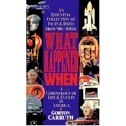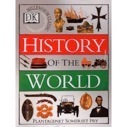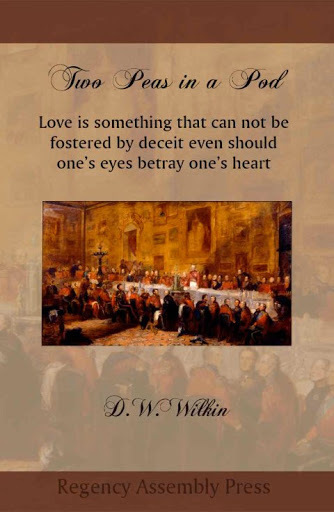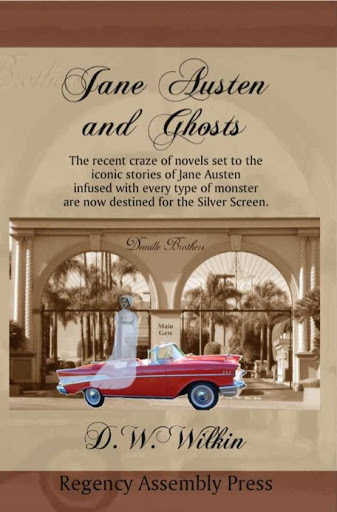A Regency Era Timeline 1801 entries complete without graphics
Timeline
Each time I start a year, I have already compiled a list, months ago with about 6000 entered of what happened from 1788 to 1837. My first step now (It took several trials to get this down to a science) is to cut out the specific year I will work on and paste it into its own spreadsheet to work with. When I worked on the entire spreadsheet, sometimes inserting a line, with all the graphics I had begun to place, took a long time. Working on each year alone, is a lot faster.
With the year separated out, I now turn to my book sources,
The Timetables of History by Grun and Stein
Chronology of CULTURE by Paxton and Fairfield
 What Happened When by Carruth.
What Happened When by Carruth.
 , History of the World. A beautiful Dorling Kindersley book.
, History of the World. A beautiful Dorling Kindersley book.
I now and diligently look through each of these to find entries that I did not come across on the internet, and other printed lists. It is possible that there are places that have more listings for each year. I have not found them. And when you go to the Timelines at the Regency Assembly Press page, there you will see all the graphical references as well. Something that I did not find anywhere else.
Here is the complete list of entries for 1801:
Year
Month Day
Event
1801
Jan 1
Giuseppi Piazzi (d.1826), Italian astronomer, discovered an asteroid orbiting between Mars and Jupiter. He believed it to be a planet and named it Ceres (goddess of the harvest).
1801
Jan 11
Domenico Cimarosa (51), Italian composer (Matrimonio segreto), died.
1801
Jan 20
US Secretary of State John Marshall was nominated by President Adams to be chief justice. He was sworn in on Feb. 4, 1801. Marshall effectively created the legal framework within which free markets in goods and services could establish themselves. He became one of the greatest judges in US History, establishing the Supreme court as final authority in determining state and federal powers.
1801
Jan 28
Francis Barber (ca. 1735 – 1801), the Jamaican manservant of Samuel Johnson (1752-1784), died at the Staffordshire General Infirmary.
1801
Jan
Toussaint Louverture, ignoring the commands of Napoleon Bonaparte, overran Spanish Santo Domingo, where slavery persisted.
1801
January
January: Emma Hamilton gives birth to the illegitimate daughter of Lord Nelson.
1801
January
January: the Act of Union with Ireland creates the United Kingdom.
1801
Feb 4
John Marshall was sworn in as chief justice of the United States.
1801
Feb 7
John Rylands, merchant, philanthropist, was born in England.
1801
Feb 17
The House of Representatives broke an electoral tie between Thomas Jefferson and Aaron Burr, electing Jefferson president. Burr became vice president. When George Washington announced that he would retire from office, he set the stage for the nation’s first two-party presidential campaign.
1801
Feb 17
Thomas Jefferson won the White House vowing to get rid of all federal taxes. He was supported by a new coalition of anti-Federalists that was the ancestor of the Democratic Party. In 2003 Jules Witcover authored “Party of the People: A History of the Democrats.”
1801
Feb 21
John Henry Newman, was born. He was the Protestant vicar who converted to Catholicism and became a Roman Catholic Cardinal. He authored “Dream of Gerontius.”
1801
Feb 27
The District of Columbia was placed under the jurisdiction of Congress.
1801
Feb 28
Motiejus Valancius, Lithuanian educator, historian, writer and bishop, was born in Nasrenai in the Kretinga region. He died May 29, 1875, in Kaunas. His portrait is on the 2-litas note.
1801
February
February: The government of William Pitt collapses over the issue of Catholic emancipation. Pitt had made veiled promises of emancipation in order to secure the Act of Union, but George III would not support it, and Pitt resigned.
1801
February
February: The Treaty of Lunéville, between France and the Holy Roman Empire, is signed, giving France control up to the Rhine and the French client republics in Italy and the Netherlands. Britian is now the sole nation fighting against France.
1801
Mar 3
1st US Jewish Governor, David Emanuel, took office in Georgia.
1801
Mar 4
Thomas Jefferson became the first President to be inaugurated in Washington, D.C. (1801-1809). James Madison became secretary of state. In his inaugural address Jefferson said: “Though the will of the majority is in all cases to prevail, that will, to be rightful, must be reasonable; the minority possesses their equal right, which equal laws must protect, and to violate would be oppression.”
1801
Mar 4
The expression entangling alliances was coined by Thomas Jefferson and used in his first inaugural address: “Peace, commerce, and honest friendship with all nations–entangling alliances with none.” These words have been commonly attributed to George Washington; although Washington supported the idea expressed, there is no record of his having used this phraseology.
1801
Mar 10
Britain conducted its first census in order to find out how many men were available for conscription.
1801
Mar 11
Paul I (46), Czar of Russia (1796-1801), was strangled in his bedroom in St. Petersburg ending 4 years of insane rule. His son Alexander I Pavlovich (23) succeeded him.
1801
Mar 14
Prime Minister of Great Britain: Henry Addington, 1st Viscount Sidmouth
1801
Mar 14
Christian Friedrich Penzel (63), composer, died.
1801
Mar 21
Andrea Lucchesi (59), composer, died.
1801
Mar 24
Aleksandr P. Romanov became emperor of Russia.
1801
Mar 25
Anthony Ziesenis (69), architect, sculptor (Camper), died.
1801
March
March: England conducts its first census.
1801
March
March: Henry Addington becomes Prime Minister.
1801
March
March: The London Stock Exchange is founded.
1801
March
March: Thomas Jefferson becomes the third President of the United States.
1801
March
March: Tsar Paul I of Russia is assassinated. He is succedded by Tsar Alexander I.
1801
Apr 2
The British navy defeated the Danish at the Battle of Copenhagen.
1801
Apr 8
Soldiers rioted in Bucharest and killed 128 Jews.
1801
Apr 11
Johann von Schiller’s “Die Jungfrau von Orleans (The Maid of Orleans),” premieres in Leipzig.
1801
Apr 12
Josef Franz Karl Lanner, Austrian composer, violist, was born. D 1843. Dance composer; he was a contemporary of Johann Strauss senior, and helped lay the foundation for the Viennese waltz.
1801
Apr 21
Saudi Arabs led Sunni raids into Karbala, Iraq, killing about 5,000 people.
1801
Apr 24
The 1st performance of Joseph Haydn’s oratorio “Die Jahreszeiten (The Seasons).”
1801
Apr 28
Anthony Ashley-Cooper, the seventh Earl of Shaftesbury and a leading social reformer of the Victorian Age, was born in England. Shaftesbury labored to establish schools, to abolish the use of small children as chimney sweeps, and to wipe out child prostitution. He was a vocal opponent of slavery but had little respect for the United States’ President Abraham Lincoln and thought the South should be permitted to secede from the Union.
1801
April
April: At the Battle of Copenhagen, Lord Nelson deals a death blow to the League of Armed Neutrality (Russia, Denmark, Sweden, and Prussia) with his destruction of the Danish fleet. When he returns to England in June, he is elevated to a viscount.
1801
April
April: The U.S. Library of Congress is founded.
1801
May 6
British Lt. Thomas Cochrane, commander of the 14-gun sloop HMS Speedy, engaged and captured the 32-gun Spanish frigate El Gamo. The climactic battle in Patrick O’Brian’s novel “Master and Commander” is based on the Speedy’s fight with El Gamo. Cochrane was later elected to Parliament, pointed out corruption and was arrested on trumped up charges. After that he served as the first commander of Chile’s navy, then Brazil’s navy and the Greek navy before returning to England. In 2000 Robert Harvey authored “Cochrane: The Life and Exploits of a Fighting Captain.”
1801
May 14
The Pasha of Tripoli symbolically declared war on the US by cutting down the glagstaff in front of the US Consulate, after learning that Pres. Jefferson had refused to pay a renewed tribute of $225,000.
1801
May 16
William Henry Seward was born. He was later Gov. of New York and the American Sec. of State from 1861-1869. Under Pres. Lincoln he purchased Alaska for the United States at 2 cents per acre.
1801
Jun 1
Mormon leader Brigham Young (d.1877), the second president of the Mormon Church, was born in Whitingham, Vt.
1801
Jun 10
The North African state of Tripoli declared war on the United States in a dispute over safe passage of merchant vessels through the Mediterranean. Tripoli declared war on the U.S. for refusing to pay tribute.
1801
Jun 14
Former American Revolutionary War General Benedict Arnold died in London.
1801
Jun 29
Frederic Bastiat (d.1850), French free-market economist, was born in Bayonne. “The state is the great fictitious entity in which everyone seeks to live at the expense of everyone else.”
1801
June
June: Cairo falls to British troops.
1801
Jul 3
Johann Nepomuk Went (56), composer, died.
1801
Jul 5
David G. Farragut (d.1870), American naval hero, was born in Knoxville, Tenn.
1801
Jul 7
A new constitution, drafted by a committee appointed by Toussaint Louverture (L’Ouverture), went into effect and declared the independence of Hispaniola. The constitution made him governor general for life with near absolute powers.
1801
Jul 16
Pope Pius VII and 1st consul Napoleon signed a concord.
1801
Jul 17
The U.S. fleet arrived in Tripoli after Pasha Yusuf Karamanli declared war for being refused tribute.
1801
Aug 1
The American schooner Enterprise captured the Barbary cruiser Tripoli.
1801
Aug 6
A 9-day revival began at the Cane Ridge Presbyterian Church in Bourbon County, Kentucky. Some 20,000 people showed up for the revival called by Rev. Barton W. Stone. 3 evangelistic Christian groups grew out of the meeting.
1801
August
August: The West India Docks open after a two-year design and construction project by William Jessop. Built on the Isle of Dogs, they are the first large wet docks built in the Port of London, and can accommodate 600 ships.
1801
Oct 6
Napoleon Bonaparte imposed a new constitution on Holland.
1801
Oct 19
The first Philadelphia aqueduct was opened providing a new supply of fresh water for the growing city.
1801
Oct 23
Gustav Albert Lortzing, composer, was born.
1801
Oct 23
Johann Gottlieb Naumann (60), German composer, died.
1801
October
October: The Treaty of London is signed, a preliminary peace treaty ending the war between France and Britain.
1801
Nov 3
Karl Baedeker (d.1859), German publisher, was born. He became well known for travel guides. His 1835 “Travel on the Rhine” is widely considered as the 1st modern guidebook.
1801
Nov 3
Vincenzo Bellini, Italian opera composer (La Sonnambula, Norma), was born.
1801
Nov 9
Carl Philipp Stamitz, composer, died.
1801
Nov 9
Gail Borden (d.1874), inventor of condensed milk, was born in New York.
1801
Nov 10
Samuel Gridley Howe (d.1876), educator of the blind, was born. He was the husband of Julia Ward Howe, author of the “Battle Hymn of the Republic.”
1801
Nov 10
Kentucky banned dueling.
1801
Nov 16
The 1st edition of New York Evening Post was published. Alexander Hamilton helped found the paper and served as editor. Under the editorship of William Cullen Bryant from 1826-1878, it was Free-Soil and supported Abraham Lincoln.
1801
Dec 24
Richard Trevithick, inventor of the steam locomotive, completed a road test of his 1st “traveling engine” in Camborne, England.
1801
December
December: Richard Trevithick builds and demonstrates the first steam-powered road locomotive.
1801
Another Act of Union joins the Kingdom of Ireland to England and Scotland, and the Union Flag sees the addition of the diagonal red cross.
1801
Architects Charles Percier and Pierre-François-Léonard Fontaine publish the Recueil de décorations intérieures, a compilation of drawings of contemporary design that will set the standard for the Empire style of interior decoration that spreads throughout Europe.
1801
Beethoven completes the “Moonlight Sonata” (Piano Sonata No. 14 in C-sharp minor, Opus 27).
1801
English horse racing at Goodwood is introduced by Charles Lennox, Duke of Richmond.
1801
Lord Elgin, with permission of the Turkish government that controls Athens, begins the removal of sculptured portions of the Parthenon, a task that takes five years to complete.
1801
Maria Edgeworth’s Belinda is publlished.
1801
The first census is held.
1801
The Union Jack becomes the new flag of the United Kingdom in 1801, incorporating the Cross of St. George (England), the Cross of St. Andrew (Scotland), and the Cross of St. Patrick (Ireland).
1801
Robert Trevithick demonstrates a steam locomotive.
1801
Britain is rising as an industrial power. The average life expectancy is around 40. A fictional “better-off” family will be described as drinking water that has a cow taste because it is taken from a brook from which cows drink. Meat is rare. Dental care is poor. The family eats with wooden spoons. Candles are rarely used because they cost too much. The father “visited the city once, but the travel cost him a week’s wages… The children sleep two to a bed on straw mattresses on the floor.”
1801
Britain makes Ireland part of a single British kingdom. Parliament in Dublin is abolished. The Anglican Church is to be recognized as the official church in Ireland. No Catholics are to be allowed to hold public office.
1801
Napoleon of France has defeated Austria. In the treaty of Lunéville, Austria renounces claims to the Holy Roman Empire.
1801
Rembrandt Peale painted his brother’s portrait: “Rubens Peale with Geranium.”
1801
Francois Rene de Chateaubriand (1768-1848), French writer, authored his novel “Atala” following a trip to the US.
1801
Samuel Taylor Coleridge, English poet, wrote to Sir Humphrey Davy a letter in which he says: “I seem to sink in upon myself in a ruin, like a Column of Sand, informed and animated only by a Whirl-Blast of the Dessert.” Coleridge had become addicted to opium in this year.
1801
Beethoven composed Op. 25 Serenade for flute, Violin and Viola.
1801
Thomas Bruce, the 7th Earl of Elgin, took the 2,500 year-old bas-reliefs from the Parthenon while he served as the British ambassador to the Ottoman Empire. 17 figures and 56 panels were put on display at the British Museum in 1816. Around 1939 the marbles were subjected to a botched scouring operation that damaged 40% of the collection. Elgin had hired Giovanni Lusieri, an Italian artist from the court of the King of Naples, to oversee the Parthenon project.
1801
Thomas Jefferson began a set of proper rules for the Senate when he wrote: ” No one is to disturb another in his speech by hissing, coughing, spitting, speaking, or whispering to another.”
1801
Elder John Leland, a Baptist minister, helped commission a 1,235-pound wheel of Cheshire cheese as a gift of gratitude for Thomas Jefferson’s steadfast support of religious liberties.
1801
The London Stock Exchange formed. British government debt was the only security traded and this remained so until 1822.
1801
French artist Girodet depicted Ossian, the mythical 3rd century blind Scottish poet, before the story was exposed as a fraud.
1801
In France Napoleon opened the Louvre to the public.
1801
Napoleon’s army in Egypt surrendered to Turkish and English forces. The French civilian toll topped 25 of 150, while the military toll topped 25,000 over the 3-year expedition. Turks recover Egypt.
1801
Friedrich von Hardenberg (b.1772), German poet (Novalis), died. He was later known as the father of German romantic nationalism.
1801
In Mexico La Iglesia de Nuestra Senora del Refugio was a Franciscan-style mission church built in the border town of Guerrero Viejo.
1801
South Ossetia was absorbed into the Russian Empire along with Georgia.
1801
In India William Carey, Protestant missionary printed his new Testament translated into Bengali on his own printing press. He also translated the Sanskrit classics into Bengali and printed the first Bengali Newspaper.
1801
The French dancer and choreographer Charles Didelot went to St. Petersburg, where he concentrated on teaching a new generation of dancers.
1801
Birth of Giuseppe Concone (D. 1861), singing master. pianist and composer, his singing exercises are still used today.
1801
In Russia the Cathedral of the Virgin of Kazan, St. Petersburg by Andrea Voronikhin (1760-1814) is a typical high imperial Russian building of the nineteenth century, modeled on St. Peter’s Rome.
1801
Thomas Milton (1743-1827) engraver, published three folios of aquatints. Views in Egypt, The Ottoman Empire and Palestine, by Liugi Mayer (d. 1803) English artists and architects were inspired by the imagery.
1801
Death of Sharaku in Japan. Portrait artists of actors and himself an actor of Nō plays. His prints were admired outside Japan for their eccentricity, psychological penetration and qualities of caricature.
1801
Prussians march into Hanover
1801
CD Grabbe German Dramatist born (D 1836)
1801
Kotzebue: “Die deutschen Kleinstadter,” Comedy
1801
Johann Nestroy Austrian dramatist and comedian born (D 1862)
1801
Robert Southey: “Thalaba the Destroyer” poem
1801
KF Gauss: “Disquisitiones arithmeticae”
1801
Hegel and Schellilng publish the “Critical Journal of Philosophy”
1801
Bank of France founded
1801
European Populations: Italy 17.2 million, Spain 10.5M, Britain 10.4M, London 864K, Paris 547K, Vienna 231K, Berlin 183K
1801
First Iron trolley tracks, Croydon-Wandsworth England
1801
Victoria Regia (“Queen of the NIght”) discovered in Amazon territory
1801
MFX Bichat (1771-1802): “Anatomie generale”
1801
American civil engineer Robert Fulton (1765-1815) produces the first submarine “Nautilus” (Brest)
1801
JJ Lalande catalogues 47,390 stars
1801
Beethoven : “Die Geschopfr des Prometheus,” Ballet in Vienna
1801
Daniel Chodowiecki, german painter died (B1726)
1801
David: “Napoleon au Grand Saint-Bernard”
1801
Goya “The Two Majas”
1801
Joseph Paxton, English Architect born (D1865)
1801-1803
Matthew Flinders circumnavigates, then names, Australia
1801-1806
Alexandre Dumas (d.1870) covered these years of French history in an 1869 serialized novel printed in the journal, “The Universal Monitor.” In the 1980s Claude Schopp, a retired French lecturer, discovered the epic novel on microfilm. He got it published under the title “Le Chevalier de Sainte-Hermine,” and in 2005 it became a top ten seller.
1801-1835
John Marshall (1755-1835) was chief justice of the US Supreme Court. In 1996 Charles F. Hobson wrote “The Great Chief Justice: John Marshall and the Law” and Jean Edward Smith wrote “John Marshall: Definer of a Nation.”
1801-1848
Thomas Cole, English born US painter. He and Asher B. Durand became fathers of the Hudson River School of painting and founded the National Academy of Design.
1801-1864
Caroline Matilda Stansbury Kirkland, American author: “Like other spurious things, fastidiousness is often inconsistent with itself, the coarsest things are done, and the cruelest things said by the most fastidious people.”
1801-1866
Jane Welsh Carlyle, English writer: “In spite of the honestest efforts to annihilate my ‘I-ity,’ or merge it in what the world doubtless considers my better half (historian Thomas Carlyle), I still find myself a self-subsisting and alas! self-seeking ME.”
1801-1921
A single Parliament legislated all the British Isles. A history of the archipelago was written in 2000 by Norman Davies: “The Isles.”
That’s right, today is the first day that it is available. Kindle’s today, and then in a week or so, you can have it in your hands physically if you so desire in Trade Paperback form as the other releases from our publisher, Regency Assembly Press does.
This release the publisher is trying out the Kindle Select program so it is exclusive to Amazon for 90 days. What that means for you, a reader, is that should you have
1) a Kindle
2) Are a member of Amazon Prime
then you can borrow the book, free to you, and try before you buy (always, please buy.)
For myself and Regency Assembly Press it is an experiment. RAP (And we hope you all are RAPpers and not RAPscallions) wants to see if this will work. They have also reduced the price of this book to half of what RAP books sell for. $3.99 for an electronic copy.
If you do not have an actual Kindle, Amazon has made it possible to read this book on virtually any electronic device. GO HERE if you want to get a copy for something other than a Kindle, or wait patiently until right before Thanksgiving (November 15th) when it will be released in all other digital formats.
Here is a picture, which of course you can click on to go fetch the book:
Love is something that can not be fostered by deceit even should one’s eyes betray one’s heart.
Two brothers that are so close in appearance that only a handful have ever been able to tell them apart. The Earl of Kent, Percival Francis Michael Coldwell is only older than his brother, Peregrine Maxim Frederick Coldwell by 17 minutes. They may have looked as each other, but that masked how they were truthfully quite opposite to one another.
For Percy, his personality was one that he was quite comfortable with and more than happy to let Perry be of a serious nature. At least until he met Veronica Hamilton, the daughter of Baron Hamilton of Leith. She was only interested in a man who was serious.
Once more, Peregrine is obliged to help his older brother by taking his place, that the Earl may woo the young lady who has captured his heart. That is, until there is one who captures Peregrine’s heart as well.
Available in other digital formats on 11/15/2012
and
We are still selling this book (and of course all our other ones.) JANE AUSTEN AND GHOSTS is not set in the Regency Era or references the timeline in anyway. However it is a great romp and I am sure that you will enjoy spending time with it.
Here is a picture, which of course you can click on to go fetch the book:
In the world of moviemaking, nothing is as golden as rebooting a classic tale that has made fortunes every time before when it has been adapted for the silver screen. Certainly any work by Jane Austen made into a movie will not only be bankable, but also considered a work of art.
That is of course until the current wave of adaptations that unite her classic stories with all the elements of the afterlife is attempted to be created. That these have found success in the marketplace amongst booklovers may not be quite understood by those who make movies. But that they are a success is understood and a reason to make them into movies.
All that being said, perhaps it would also be fair to say that the very proper Jane, were she present to have anything to say about it, would not be pleased. Of course she has been away from this Earth for nearly 200 hundred years. But does that mean were she upset enough, she wouldn’t come back?
Ellis Abbot found stories for tinseltown to make into movies. His most recent find were the batch of stories set in the regency world of Jane Austen. Jane Austen and Monsters.
Meeting with the various authors of those works, it did not seem that Ellis could get one coherent plot of script out of any of them. At least not until he got help from the best source of all.







